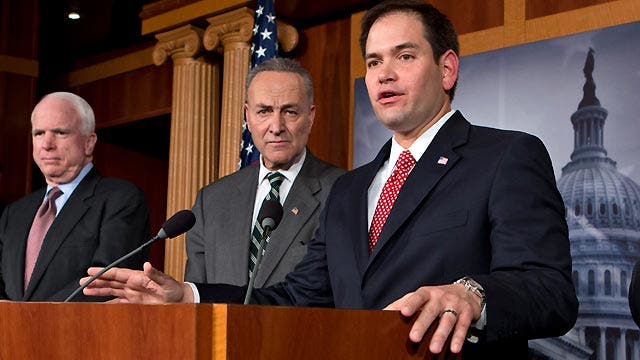The immigration overhaul plans being pitched by a group of senators and President Obama each include the possibility of citizenship for illegal immigrants -- and with that comes major electoral implications for Democrats and Republicans in future elections.
The president's plan purportedly allows the country's estimated 11 million illegal immigrants to essentially control their own destiny toward citizenship, by submitting to security checks and paying back taxes and fines. By contrast, the bipartisan Senate plan would hinge on the federal government first securing the border.
The faster illegal immigrants are allowed to become citizens, the sooner they'll be allowed to vote. And some Republicans say the move could boost the Democratic voter base -- in the last election, 71 percent of voting Hispanics backed Obama. But at the same time, Republicans say any move to legalize the undocumented population could be an opportunity for their party as well.
"Adding more Latinos to the voter rolls is not a slam-dunk for Democrats," Republican strategist Tyler Harber said. "Likewise, it isn't another nail in the coffin for Republicans, as many pundits will pontificate."
Harber conceded citizenship would "significantly change the political landscape, tilting the eligible voting population more Democratic."
Harber, managing partner for Harcom Strategies International, argues that granting somebody citizenship doesn't guarantee he or she will vote. He also said districts with large Latino populations will likely shift more Democratic but the new voters could pull the Democratic Party further right ideologically "as Latino voters are more likely to be pro-life, pro-traditional marriage and overall more conservative than other Democratic-leaning subgroups."
The president announced the details of his plan Tuesday in Las Vegas, a U.S. city with a large and growing population of legal and illegal immigrants, in the battleground state of Nevada which Obama won in November.
Obama, who has made comprehensive immigration reform a second-term priority, touted a plan based on his 2011 proposal that focuses on:
- a pathway to citizenship
- improved border security
- an overhaul of the legal immigration system
- helping businesses verify the legal status of workers
The key points of the Senate plan, crafted in part by Republican Sens. John McCain, of Arizona, and Marco Rubio, of Florida, are:
- a pathway to citizenship, contingent on securing the border
- better tracking of people in the U.S. on visas
- background checks
- paying fines and taxes to qualify for a "probationary legal status"
Colorado Secretary of State Scott Gessler has a similar view to Harber's.
Gessler, a Republican who has been active in trying to clear the state's rolls of ineligible voters, cautioned against assuming illegal immigrants will automatically vote Democrat should they become citizens.
"You might think that by looking in the rear view mirror," he said. "But that's not necessarily the case. Illegal immigrants come here and want to work hard and are family oriented with a 'make of one's self what you can' mentality. I believe Republicans have a better message of jobs and growth. That shouldn't be taken for granted."
Taylor Griffin, a Republican strategist with Washington-based Hamilton Place Strategies, also thinks citizenship will likely help Democrats in the long run but not enough to significantly change the electoral landscape.
"There are not a lot of competitive districts," he said. "My hunch is legalization would just add to the numbers, accelerate the trend."
However, Griffin argues the reform efforts shouldn't be seen as "purely a matter of electoral politics."
He suggests Republican lawmakers joining the reform effort is a major step for a party that has "alienated" Hispanic voters in recent years, to the point where George W. Bush in 2004 did better with that voting bloc than 2012 GOP presidential candidate Mitt Romney did this past election cycle.
Fernand Amandi, who worked on Hispanic research and media efforts for the 2012 Obama campaign, told Fox News the real question is whether "Republicans are going to be seen and perceived as a roadblock to the president's intentions of passing a comprehensive immigration bill."





